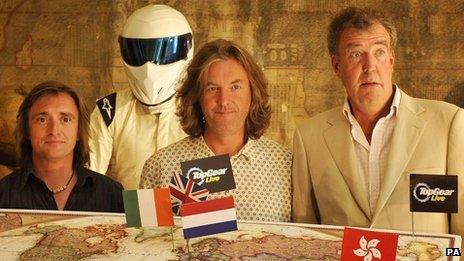Top Gear 'breached guidelines' on disability
- Published

Top Gear regularly attracts audiences of around 5 million
The BBC Trust has ruled that comments on Top Gear which likened the design of a camper van to people with facial disfigurements, did breach guidelines.
An appeal has found presenter Jeremy Clarkson, who called facial growths "really ugly things", had played on a "stereotypically negative reaction".
It ruled that remarks about not wanting to talk to the camper van at a party were "not editorially justified".
The episode of the hit BBC Two motoring show was broadcast on 5 February.
The comments in question were made during an exchange between presenters Clarkson and Richard Hammond, while reviewing a Prius camper van.
The BBC Trust's Editorial Standards Committee reviewed the remarks following an appeal from a member of the public, who had complained they were "offensive, prejudicial and unacceptable".
Previous investigations found the show had not breached guidelines, and the BBC said it felt it was clear the joke was on Clarkson or the camper van itself.
At the time the BBC apologised, saying it was "genuinely sorry" for causing upset, but hoped "it would be clear from the absurdity of the context that no offence was intended".
'Offensive stereotype'
The committee's report said the show's audience enjoyed the presenters' "sometimes controversial and forthright views".
It found Clarkson's slurred speech while referencing Joseph Merrick, played by John Hurt in The Elephant Man, was "on the margins of acceptability".
However it upheld the original complaint, ruling that comments near the end of the exchange, suggesting not being able to look at a person with facial disfigurement, "strayed into an offensive stereotypical assumption".
Clarkson had said on the show: "That is not a car that you could talk to at a party unless you were looking at something else is it?"
The show's executive producer had previously acknowledged that the segment was scripted, rather than ad libbed by presenters, and had been through the BBC's compliance system.
But finding the programme in breach of guidelines on harm and offence, the committee said the comments "did not meet generally accepted standards in the context of their portrayal of a disability".
It concluded that it was not necessary to change the guidelines, in ways that had been suggested in the complaint.
One hundred and thirty-seven complaints were originally received about the Top Gear episode.
However, the committee did note that charity Changing Faces, which helps people affected by conditions, marks or scars that alter their appearance, had drawn attention to the programme and asked their supporters to contact the BBC.
'Changing attitudes'
The charity said today that it welcomes the BBC Trust's decision to uphold its complaint.
"Everyday people with an unusual appearance and other disfigurements suffer bullying, ridicule and hate crime," said Changing Faces founder James Partridge.
"This is a small step towards changing attitudes. It is vital that people with disfigurements are not seen as fair game for low level jibes which are unacceptable and cruel."
Mark Boylan, who has a cystic hygroma and haemangioma which causes facial growths, added that as a "genuine Top Gear fan" he was "gutted presenters felt the need to stoop to such a low level".
He said: "Their humour singled out people who are visibly different. Although some may perceive these as harmless remarks, the fact that they were seen by millions could potentially influence their reactions to people with visible differences.
"Even though we are in the minority, our right to respect is equal to that of any majority."
- Published14 March 2012
- Published20 February 2012